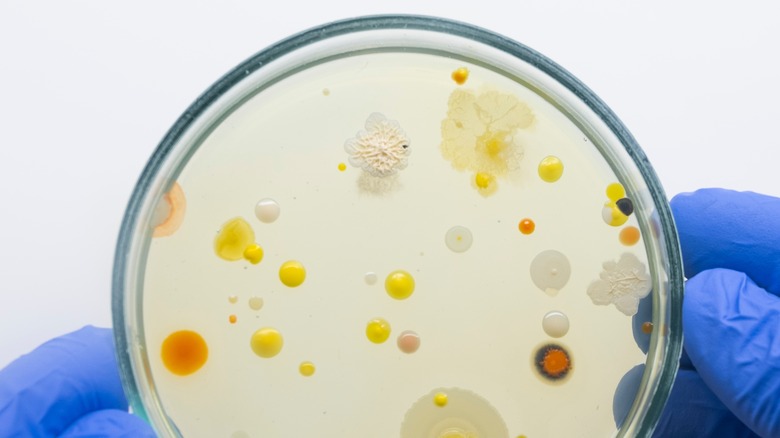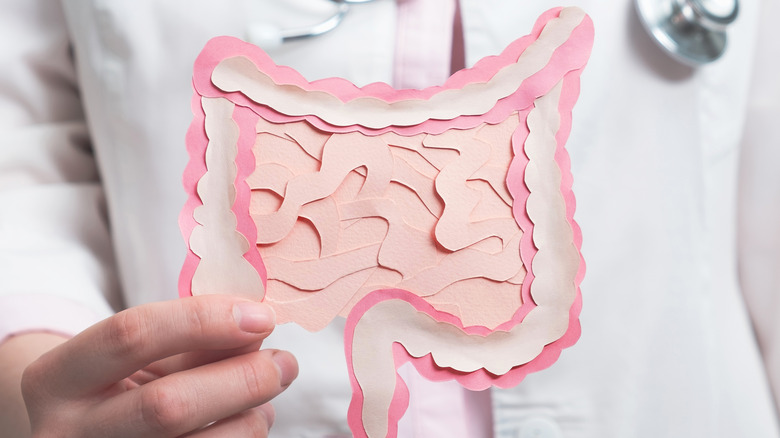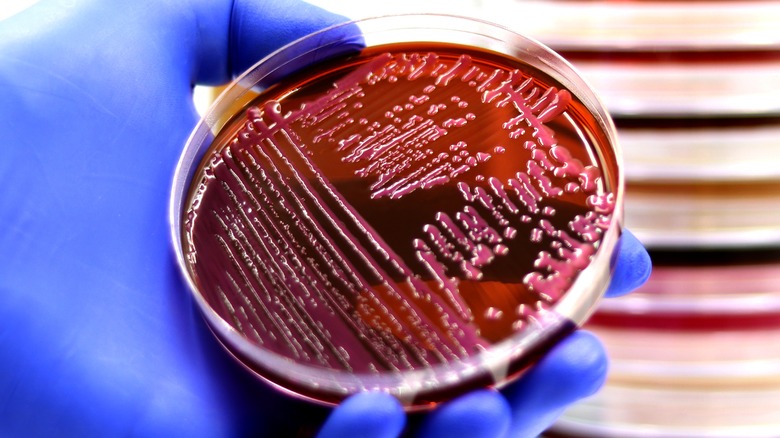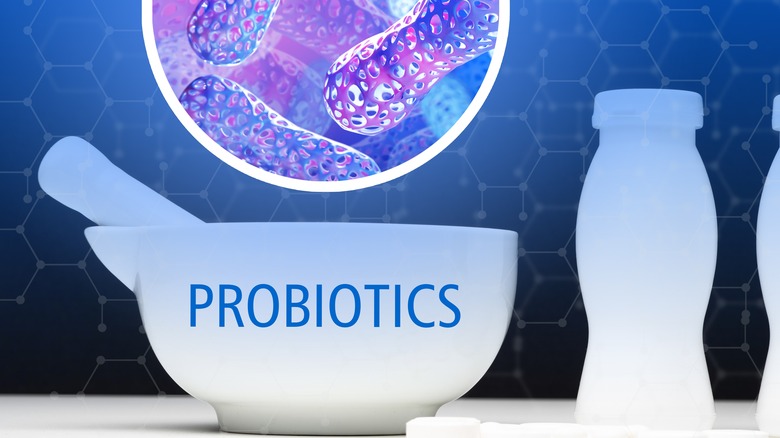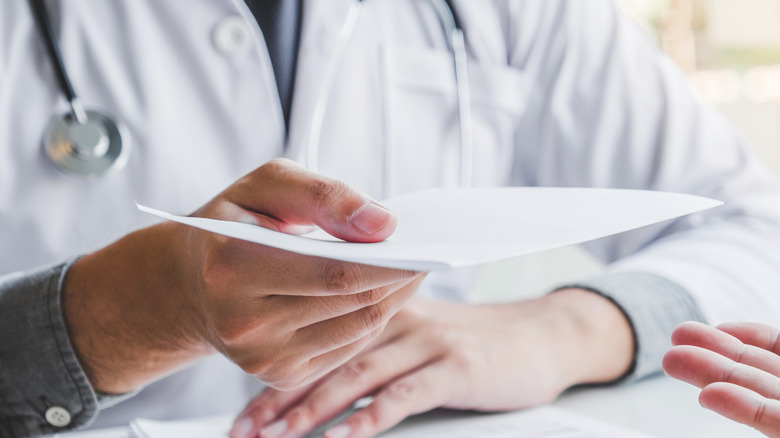What Happens To Your Body When You're Taking Antibiotics
Antibiotics are a type of medication that are used to treat bacterial infections. Antibiotics have a long history, dating back centuries when people used mold and other natural substances to treat infections (via Microbiology Society). However, it wasn't until the twentieth century that the real magic began. In 1928, Alexander Fleming discovered penicillin, a natural antibiotic produced by the mold Penicillium. This was a game-changer in the medical world, as it was the first effective treatment for bacterial infections. After the discovery of penicillin, other antibiotics quickly followed suit, like streptomycin and tetracycline. These antibiotics were effective against many bacterial infections and significantly improved treatment.
Antibiotics have saved millions of lives, and are still a significant part of modern medicine. But as the saying goes, with great power comes responsibility. The overuse and misuse of antibiotics have led to the development of antibiotic-resistant bacteria, making it more difficult to treat certain conditions. While antibiotics are life-savers, they can also have side effects and negative consequences on the body (per New Scientist). So, next time you pop an antibiotic, consult your healthcare provider and follow their instructions carefully. This article will help you to better understand what happens to your body while you're taking antibiotics.
Not all antibiotics are created equal
Many classes of antibiotics work in different ways. Because antibiotics are designed to target specific types of bacteria, they are not all created equal. Penicillin, for example, works against gram-positive bacteria like streptococcus and staphylococcus, whereas tetracycline prevents bacteria from producing the protein necessary for them to thrive (via Merck Manual). In addition, tetracycline cannot be taken with antacids and many supplements, as these substances interfere in the absorption of the medication.
Furthermore, Cochise Oncology states that some antibiotics are broad-spectrum, meaning they are effective against a wide variety of bacteria and can treat severe infections of the bone, heart, or brain. Conversely, narrow-spectrum antibiotics are particularly effective against specific types of bacteria, per a study published in MedChemComm. These antibiotics may help reduce the chance of developing antibiotic resistance, as they only target a particular infection. Various antibiotics can cause allergic reactions, while others can cause digestive problems or other side effects. Depending on the patient's specific condition, this may make certain antibiotics less desirable.
Finally, the cost of antibiotics can influence whether a specific antibiotic is appropriate for a patient. Some antibiotics are prohibitively expensive, making it difficult to prescribe to patients on a tight budget. Furthermore, some do not yet have a generic option (as generic versions can only be approved after the expiration of brand-name drug patents, per Hawaii Medical Service Association), and thus do not allow for cost savings (via K Health).
This is what happens to the good bacteria in your gut
Antibiotics are effective in treating bacterial infections, but also have the potential to harm the good bacteria in the gut. Antibiotics do not differentiate between beneficial bacteria that live in the gut and harmful bacteria that cause infections. To minimize this risk, it is essential to use antibiotics only when necessary and consult with a healthcare professional to ensure you take the appropriate antibiotic for your infection (per Children's Health).
A study published in Frontiers in Cellular and Infection Microbiology reveals that the gut microbiome is a complex ecosystem of trillions of microorganisms. This ecosystem plays a vital role both in maintaining good health (by aiding digestion, nutrient absorption, and the production of vitamins and hormones) and in the immune system (by protecting the body from harmful pathogens).
When antibiotics are taken, they can disrupt the delicate balance of the gut microbiome by killing or inhibiting the growth of beneficial bacteria. This can lead to various issues, such as diarrhea, nausea, and antibiotic resistance. Furthermore, harmful bacteria can multiply and take over when good bacteria are killed, resulting in infections in the gut, such as Clostridium difficile (C. diff). It isn't easy to cure when this happens, and many people end up hospitalized (via Frontiers in Microbiology). The antibiotics that caused this infection must usually be stopped, and new antibiotics are given to target the new condition, inadvertently complicating things further.
This is what happens when antibiotics are misused
Antibiotic resistance is like a game of Whack-a-Mole for bacteria. They develop new ways to survive and resist when we hit them with antibiotics. Misusing or overusing antibiotics is like giving bacteria cheat codes, allowing them to quickly adapt and become antibiotic-resistant superbugs. Fortunately, we can take control and slow down the spread of resistance by using antibiotics wisely and under the guidance of a healthcare professional.
According to the World Health Organization (WHO), antibiotic resistance is a significant global health concern. It can affect people of all ages and backgrounds, and is caused by natural processes as well as antibiotic misuse. As antibiotic resistance grows, certain infections become more difficult to treat, resulting in longer hospital stays, higher medical costs, and increased mortality. The Centers for Disease Control and Prevention (CDC) reports that this is because microorganisms can "develop defense strategies against antibiotics and antifungals." These mechanisms are determined by the specific proteins coded for by the microorganism's DNA. Over time, germs that are already difficult to treat can become virtually untreatable, due to resistance passed on to them at the genetic level. Worse, other pathogens can also benefit from this enhanced resistance, even before they come into contact with any antibiotic or antifungal substances.
Watch out for superbugs
Superbugs are a type of antibiotic-resistant bacteria that can cause serious infections and are difficult to treat (via Mayo Clinic). These tiny invaders have developed mechanisms to resist the effects of antibiotics, making them less effective at killing the bacteria (and thus resulting in prolonged or more severe infections).
Superbugs are a growing public health concern, as they can spread easily and quickly, making them difficult to contain. They can also cause infections that were once easily treatable, such as urinary tract infections, to become life-threatening. In some cases, superbugs can even cause completely untreatable infections. According to News in Health, superbugs infect over two million people worldwide annually.
One of the main reasons for the emergence of superbugs is the overuse and misuse of antibiotics (per News Medical Life Sciences). When antibiotics are used too frequently, or for conditions that do not require them, the bacteria are exposed to the drugs and have a greater chance of developing resistance. Additionally, living in unsanitary conditions, using antibiotics in agriculture and farming, and mishandling food during preparation significantly contributes to creating superbugs.
Allergic reactions can happen with antibiotics
Antibiotics can cause an allergic reaction in some people. An allergic reaction to antibiotics occurs when the immune system overreacts to the medication and produces excessive antibodies, leading to hives, itching, and difficulty breathing (via MedlinePlus). In rare cases, an allergic reaction to antibiotics can be life-threatening. In most cases, the first time you take an antibiotic, you may not experience a reaction as your body builds the antibodies. However, a subsequent dose can be the trigger as the body reacts to the medication.
According to an article in StatPearls, allergic reactions can occur with any antibiotic, but some antibiotics are more likely to cause an allergic reaction than others. Penicillin is the most common antibiotic associated with allergic reactions, but other antibiotics, such as cephalosporins, sulfonamides, and macrolides, can also cause allergic reactions.
People with a history of allergic reactions or have previously had an allergic reaction to an antibiotic are at a higher risk. If you are experiencing a reaction, you must contact your healthcare provider for guidance. In addition, if you are developing a more severe reaction, such as wheezing or difficulty breathing, call 911, as this can quickly turn into a life-threatening event (per The University of Maryland).
Can antibiotics sabotage your protection?
Antibiotics and birth control are commonly used medications — but can they interact with each other and make birth control less effective? It depends on the type of birth control and the antibiotic being used (via WebMD).
According to a study published in the Canadian Journal of Infectious Disease, rifampin is the only antibiotic that reduces estrogen levels and renders birth control ineffective. In addition, Healthline reports that rifampin can reduce the effectiveness of all hormonal birth control methods such as the pill, patch, and ring. Another study in the Journal of Clinical Pharmacology takes it even further to discuss rifampin's mechanism of increasing the metabolism of estrogen in the liver, which can lead to lower hormone levels in the blood. This can make it more difficult for hormonal birth control methods to prevent pregnancy.
If you are taking antibiotics and using hormonal birth control, it's important to talk to your healthcare provider about the potential for interactions. They can help you weigh the risks and benefits of using both medications and determine if a different form of birth control, such as condoms, is needed.
How antibiotics disrupt the balance of vaginal flora
Ladies, have you ever been prescribed antibiotics for a bacterial infection, only to end up with a pesky yeast infection soon after? You're not alone! Antibiotics can disrupt the balance of bacteria in your vaginal region, leading to the overgrowth of yeast and resulting in a yeast infection (via Medical News Today).
Some symptoms you may experience when this happens are itching, burning, or white, clumpy vaginal discharge. This can be frustrating and uncomfortable, but it's important to understand that antibiotics are not selective in their target bacteria. They kill both the harmful bacteria causing the infection and the good bacteria that keep yeast in check.
So, next time you're prescribed antibiotics, be mindful of the potential side effect of a yeast infection and talk to your healthcare provider about ways to prevent it. They may suggest limiting sugary or processed foods, avoiding tight-fitting clothing, and eating foods high in probiotics, such as cultured yogurt, or taking probiotic supplements to replace the good bacteria being lost (per Khealth).
How antibiotics may impact your mental health
Antibiotics can impact mental health and mood by changing the balance of bacteria in the gut, a process known as the gut-brain axis. A study in the Journal of Internal Medicine reports that this axis links the gut and the brain, and when intestinal flora changes, mental health can be impacted primarily with symptoms of depression and anxiety. However, while this relationship between antibiotics and mental health is unlikely, it is essential to be aware of the possibility.
The first case of antibiotic-induced depression was reported in 2010. A 75-year-old man with no history of psychiatric illness became severely depressed and committed suicide. He had received antibiotics for a postoperative wound infection. The coroner revealed that the treatment of Levaquin and Bactrim was the primary cause of his suicide. This alerted the medical world to look into this potentially serious associated risk. In addition, John Hopkins Medicine reveals the possible increased risk in patients with existing mental health conditions and behavioral changes.
Though there are reported cases of mental health concerns and antibiotics, research linking antibiotics and mental health is still in its early stages. More research is required to understand the relationship entirely. Check with your healthcare provider if you have concerns.
If you or someone you know needs help with mental health, please contact the Crisis Text Line by texting HOME to 741741, call the National Alliance on Mental Illness helpline at 1-800-950-NAMI (6264), or visit the National Institute of Mental Health website.
Antibiotics can interact with other medications
Taking one medication for your health may seem simple enough, but what happens when you must take multiple medications simultaneously? The risk of medication interactions becomes a real concern at this point. Antibiotics are no exception; they can interact with other medications you're taking, causing unexpected side effects or decreasing the medication's effectiveness. And according to MDLinx, there are too many interactions for most physicians to track.
For example, if you have rheumatoid arthritis or another condition that requires you to take methotrexate and are prescribed penicillin for an infection, the interaction of the two drugs can have serious consequences because penicillin slows the kidneys' ability to clear the methotrexate, potentially leading to toxicity. Furthermore, if you take blood thinners such as warfarin, cephalosporin antibiotics can increase your risk of excessive bleeding.
Thus, it's critical to keep your healthcare provider updated on all medications, supplements, and vitamins you're taking, as well as any pre-existing health conditions. This will assist them in identifying potential interactions and modifying your treatment plan as necessary. Furthermore, always read the labels on your medications and consult your pharmacist if you have any questions.
Probiotics - fighting to save good bacteria
Probiotics are beneficial for maintaining a healthy immune system, and can be a helpful addition to an antibiotic or daily wellness regimen. They can help to reduce or prevent side effects caused by antibiotics, such as diarrhea, bloating, and gas. Probiotics also help to restore the balance of good and bad bacteria in the gut.
A study published in the Journal of Family Medicine found that one-third of patients taking antibiotics reported having diarrhea associated with antibiotic therapy. 17% of antibiotic-associated diarrhea is fatal, with Clostridium difficile (C. diff) being the leading cause of mortality. The study also found that probiotics effectively prevented and treated diarrhea associated with antibiotic use, resulting in a 66% reduction in the development of C. diff. This is a significant benefit in reducing mortality rates from this infection.
Besides taking a probiotic supplement, you can get many benefits from foods containing probiotics, as discussed in an article by Dr. Ruscio. Some foods include yogurt, kefir, sauerkraut, kimchi, miso, tempeh, and kombucha. Yogurt in particular is a well-known source of probiotics, possessing live cultures of beneficial bacteria like Lactobacillus and Bifidobacterium.
Safe and effective antibiotic use
When taking antibiotics, it is essential to follow a few guidelines to ensure the medication is effective and reduces the risk of side effects.
Antibiotics kill bacteria, but if you don't take the medication as directed, it can lead to antibiotic resistance, making the medication less effective (per the CDC). Thus, you should not change the dosage or frequency of your antibiotics without consulting a healthcare professional, nor should you double up on the next dose if you miss a dose. According to the American Academy of Pediatrics, it is especially crucial for children to take the medication exactly as the healthcare provider prescribes.
Second, taking antibiotics for the entire course of treatment is important, even if you start to feel better before the medication is finished. Stopping the medication early can lead to the bacteria becoming resistant to the antibiotic and the infection returning (via Dignity Health). Lastly, avoid taking antibiotics unnecessarily. Antibiotics are ineffective against viral infections such as the common cold, and should not be taken to prevent or treat these illnesses (via the CDC). Taking antibiotics when they are not needed can also lead to antibiotic resistance, making the medication less effective when it is required.


